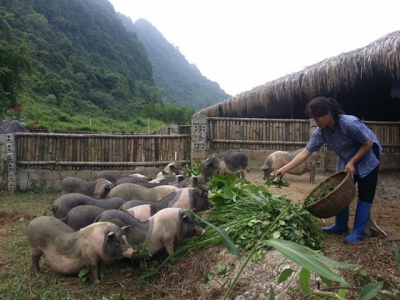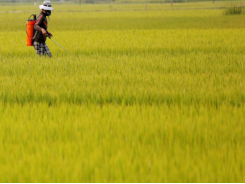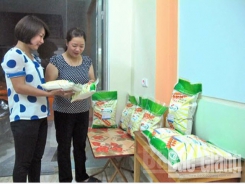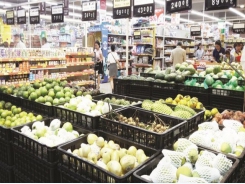Tea pork farm makes a big hit in Ninh Bình

Pigs are fed with fermented tea and herbs. — VNS Photo Tuấn Hoàng
NINH BÌNH — Under ancient tea trees at the foot of Sắng Mountain in Gia Viễn District, the northern province of Ninh Bình, lays a picturesque farm, where hundreds of pigs live.
They eat fermented tea leaves, shower in tea water, relax under tea tree canopies with lilting melodies, and snuggle into a carpet of tea leaves on cold winter days.
The idea of a green tea pork farm first struck Nguyễn Hồ Diệp Hà, 34, when she read about the model in a Japanese newspaper.
“I am always curious about the difference between factory farmed and tea-fed pigs then I asked my friends to buy me tea pork at supermarkets in Tokyo,” she said. “The rumour was confirmed. The pork was so tender and sweet, especially when dipped into Phú Quốc fish sauce.”
The experience motivated Hà to go on a field trip to Japan, visiting pig farms in Shizouka Prefecture, well-known as a production hub for green tea. Their pigs, named tea-ton (tea pork), are treated with green tea provided by local plantations.
In South Korea, she witnessed pigs being farmed in large tea production areas. Pork belly is served at traditional BBQ restaurants.
Showering in tea water helps improve pigs’ immune systems, while eating fermented tea leaves and a carefully designed diet helps them burn fat and get rid of ’negative cholesterones’. These farms are also kept free of flies, mosquitoes and unpleasant smells due to tea.
When Hà’s uncle died of cancer she felt inspired to open an organic farm to offer people green goodness.
More than 65 per cent of Vietnamese eat pork daily. Tea trees are planted from north to south and Vietnamese tea is exported to all over the world. “Why don’t we produce tea pork for domestic use?” she asked herself.
Pursuing her dream, Hà quit her job and established Orgen Company with some friends.
They found Sắng Mountain a year later. Clean water, fresh air and the untouched area makes it ideal for their farm; V-Organic. Surrounding the mountain are hundreds of tea trees, some more than 200 years old.
“It looked like a jungle at first. We set up a temporary shelter then spread out to go reclaiming the land. Snakes and mosquitoes attacked us. It took the group three months to build the farm,” Vũ Hữu Lương, V-Organic farm manager recalled.
Thái Bình Province’s indigenous pigs were chosen due to their pleasant smell and flavour. However, as the price was too high, the demand for tea pork remained low. Ten people gave up, leaving Hà with a mess. Fortunately, some other friends gave her a hand and offered samples to friends and relatives and changed the communication strategy. At last, there was light at the end of the tunnel.
In their 12ha farm, they save 10 ha for an ancient tea tree plantation. Eight farmers are in charge of 500 pigs, more than 2,000 chickens, several cows and a vegetable farm.
Their passion makes the job easier.
“After three months, I can handle both farming and ranching,” said Trần Thị Cúc, 28. Cúc has worked at the farm for two years.
Noboru Kinoshita, 60, a reputable Japanese businessman, is a special worker at the farm. Passionate about promoting quality Vietnamese products and introducing them in Japan, he decided to stay at the farm to help take care of tea pigs after a visit.
Every day, Kinoshita picks up fresh tea leaves to prepare food for the pigs. They eat a combination of tea, garlic, ginger, herbs, vegetables and earthworms to supply nutrition, reduce stress level and boost pigs’ natural immune strength.
Slaughtering follows strict procedures to avoid toxins which make pork taste bad.
They also create processed foods using tea pork including paté or sausages and have set up an e-commerce outlet store to reach more customers.
“Our farm supplies 1,000kg of tea pork a day,” Hà said.
She and her colleagues are working to bring Vietnamese high-quality agricultural products to the world.
Related news
Tools

Phối trộn thức ăn chăn nuôi

Pha dung dịch thủy canh

Định mức cho tôm ăn

Phối trộn phân bón NPK

Xác định tỷ lệ tôm sống

Chuyển đổi đơn vị phân bón

Xác định công suất sục khí

Chuyển đổi đơn vị tôm

Tính diện tích nhà kính

Tính thể tích ao




 HCM City specifies key agricultural products
HCM City specifies key agricultural products  Agricultural products are still struggling to enter supermarkets
Agricultural products are still struggling to enter supermarkets